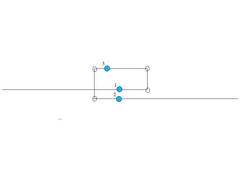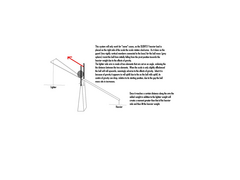davidcarr
|
| posted on 1/2/06 at 05:15 PM |

|
|
With that setup the heavy weight would still drop. 
It really depends on what you want the behaviour to be.
To get it to act like the small mass was in fact larger, so that when you put both on it would drop towards the smaller mass, you could either:
Increase the moment of the small mass around the piviot. The simple way is to increase the distance from the pivot point - but this has been
suggested.
Reduce or counteract the moment of the large mass around the pivot. This involves reducing the distance of the large mass from the pivot, or
counteracting it, perhaps with a spring above the scales on the heavier side or below the scales on the lighter side? A nice strong spring near the
pivot on the light side (below it) would do this nicely.
If however, as you say, you'd like the scales to go up when the large mass was added, you need to get some energy into the system without the
kids seeing.
What about a hollow bar acting as the lever with a heavy ball bearing in it. If you sloped (ever so slightly) the inside of the bar down towards the
light side you could prime it with the ball bearing at the top of the incline(heavy side) and have a release mechanism triggered by the addition of
the larger mass (just like a mouse trap). The ball rolls to the light side, adding weight, et voila. With the addition of a spring to countact some
of the moment of the heavy weight, the bearing wouldn't have to be all that heavy.
[Edited on 1/2/06 by davidcarr]
|
|
|
|
|
davidcarr
|
| posted on 1/2/06 at 05:31 PM |

|
|
Its also about how you carry out the experiment.
The system is always going to tilt towards the first mass you put on - unless you use the ball bearing thing.
Say you only had one mass. Put it on, ball bearing releases, scales go up, kids go wow.
It wouldn't work so well with 2 masses since as you've got to put one on first, the scale will already be heavily tilted to one side
(light side), when you put the second on, it won't be able to go any further and so won't be amazing even if it does want to go
'down' further on that side.
With 3 masses, 2 the same, you could put one on each side (after agreeing that they were each the same mass with the kids). Then you could put
another on the heavy side, trigger the mechanism and the light side will go down. Kids go wow.
Sorry, just a stream of consciousness.
And excuse my use of small mass/light weight. I know mass(Kg) * 9.8=weight(N) on Earth, its just easier to use light than small.
|
|
|
DarrenW
|
| posted on 1/2/06 at 05:47 PM |

|
|
As i said before id say easiest way would be to use dummy weights that gave the illusion that one is heavier than the other.
I assume that being a demo rig of huge proportions the kids wont actually get to touch it.
|
|
|
chriscook
|
| posted on 1/2/06 at 06:55 PM |

|
|
Does this work? Blue circles are pivot points and open circles are joints between levers. All levers are say 10:1 ratio. 1kg on one side should
balance 10kg on the other side. The bottom 2 pivots could be coaxial - not sure if the balance arm would appear to bend when not balanced though and i
can't be bothered to do the trig!
Chris
 
Rescued attachment scales.jpg
|
|
|
MikeRJ
|
| posted on 2/2/06 at 11:25 AM |

|
|
That would sort of work, but the heavy mass would be raised a 1/10th of the distance that the light mass falls, so it would indeed "bend"
in the middle quite significantly.
|
|
|
fastenuff
|
| posted on 2/2/06 at 09:23 PM |

|
|
I asume the scales are ment to look symetrical left and right same length (Arm)
For a solution you need to set a procedure written down, as i a manual.
With tricking audience you have to make sure it is done well. If you make sure a guide/teacher operates the devise they have to be clued in on how it
works.
If the public is to operate the machine you have you have to limet the choices they can make, as in left is organic/ less harmful than the right side.
use incompatible hooks to load bad and good side.
one way of going about it is to load, the more harmful side first so a counterweight can be released or locked.
another is by making the containers of differend weihgts.
neither are good when the gen. public are to use the scales
Ingmar
|
|
|
fosko
|
| posted on 3/2/06 at 06:39 PM |

|
|
All a bit confusing to me but a fiend of mine came up with this. he says the idea is flawed and can be improved on, but should work. Hope the pic
works not posted pics up on here before.
 
Rescued attachment untitled.JPG
|
|
|









